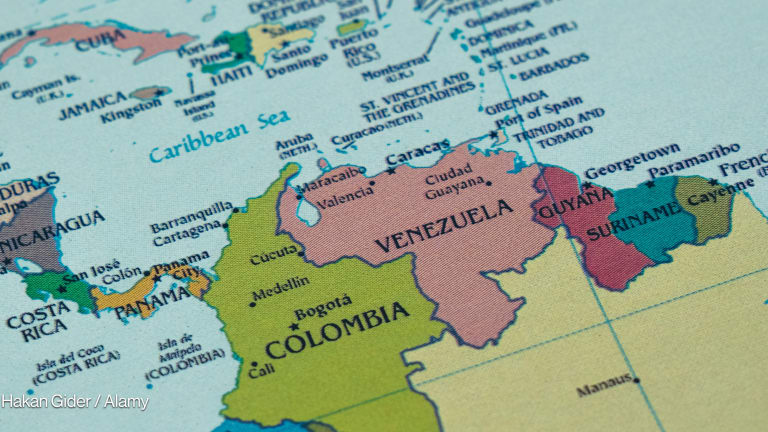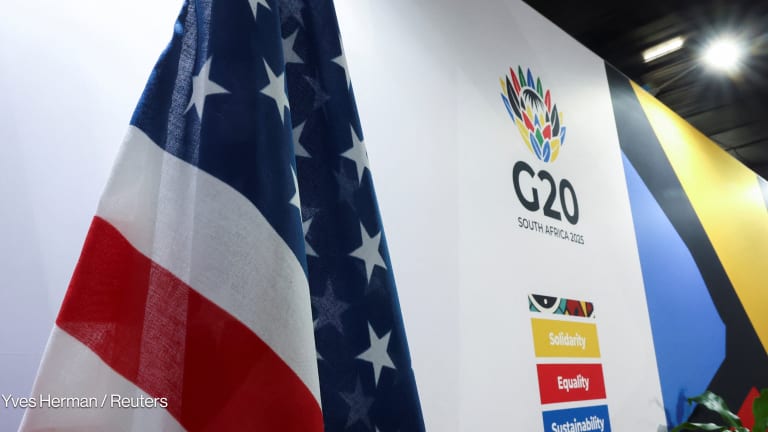
More than 1,000 participants — including 40 ministers and three heads of state — from 65 countries are descending on the World Economic Forum on Latin America’s three-day conference in Buenos Aires.
The forum, focused on deciphering Latin America’s challenges, comes at a critical time for the region, considering some historic transitions to peace and restored diplomatic relations, as in the cases of Colombia and Cuba. The region is also expecting 11 elections in the next two years, including presidential elections in Brazil, Mexico, Colombia, Paraguay, Costa Rica and Venezuela.
In addition, for the first time since 2010, developed and emerging economies in Latin America are in a period of sustained growth, as The Economist reported last month.
Here, we take a look at the progress — and setbacks — that some Latin American countries have seen recently.
Colombia
Colombia signed a peace deal with the country’s largest rebel group, the FARC, late last year, ending more than 50 years of civil armed conflict. This could well position Colombia’s economy — now the third largest in Latin America — to grow, as its government suggests. But some are questioning how the deal will actually be implemented. While more than 7,000 rebel soldiers are in the process of demobilizing in U.N.-supervised zones, there are concerns from both sides about noncompliance with the agreement, as the Los Angeles Times reports. Meanwhile, Colombia is reportedly producing more cocaine than ever, despite its long-fought war on narcotics.
Brazil
3 topics to watch at World Economic Forum Latin America
Despite forward momentum, Latin America remains the world’s most unequal region, with ongoing humanitarian and political crises, skills gaps and long recessions plaguing once strong economies — all issues Devex will be on the ground covering in Buenos Aires. Here are three things we expect to be both top of the agenda and the buzz of many side conversations at the World Economic Forum on Latin America.
Though it is the largest economy in Latin America, Brazil finds itself in the midst of a harsh, long recession and “economic rout.” In February, for the first time in two years, it added jobs to its struggling economy, which has prompted anxiety for many Brazilians. But that hint of an economic bright spot has been mirrored by political chaos. The country could soon face the second removal of a sitting president in two years, as a result of corruption. Brazil’s top electoral court will soon hear the campaign funding case of President Michel Temer, adding to the uncertainty in the country right now. Brazil’s Amazon, continuing to face deforestation, may also risk the introduction of additional infrastructure projects.
Mexico
As soon as Donald Trump won the U.S. presidency in November, economists began downgrading Mexico’s growth forecasts for 2017. The peso dropped on every mention of the new White House’s renegotiating the North American Free Trade Agreement and penalizing U.S. companies that open factories in Mexico and elsewhere. Though the full impact remains unclear, Mexico is likely to see slower growth going into presidential elections in 2018. The economic slump follows several years of reform that have hit citizens particularly hard. President Enrique Peña Nieto launched 11 structural changes in areas as wide-reaching as the oil industry and education, aimed at reducing government costs and increasing competitiveness. But for now, citizens have largely seen change come in the form of rising oil prices and of lost government jobs. Many regions also continue to suffer from violent crime and the actions of brutal drug cartels. More than half of respondents in a recent nation-wide survey said they felt insecure in their current place of residence.
Venezuela
Once among the wealthiest nations in the Western hemisphere, oil-rich Venezuela today faces a deep economic, humanitarian and political crisis. Government currency controls and expropriations has led to a shortage of most major consumer goods, which are now strictly rationed by the military. Food riots have erupted, thousands have streamed over the borders into neighboring Colombia and Brazil to seek medical care, and widespread insecurity has pushed the number of Venezuelan asylum seekers to the highest level in decades. Regional countries are worried about spillover, both political and humanitarian. President Nicolás Maduro has held off attempts by the opposition-controlled parliament to hold a recall referendum on his power, and the loyal supreme court briefly disbanded congress last week. Many analysts fear that widespread discontent, combined with rampant crime and militia violence, could deteriorate into all-out conflict. Meanwhile, once-eradicated diseases including malaria and diphtheria have re-emerged, amid a lack of medicines and a collapse of health care.
For everything you need to know about the World Economic Forum on Latin America, follow our coverage this week and join the conversation on Latin America's future. Follow @devex, @kellierin, @amylieberman and @raj_devex and tag #la17 and #wef.









